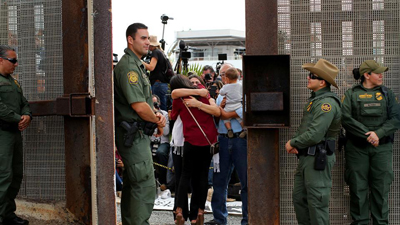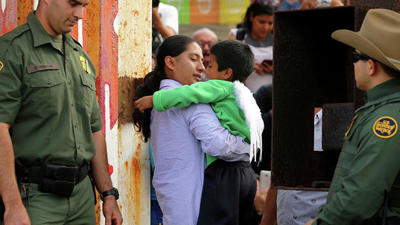About six months after Donald Trump became president, an illegal immigrant named Jeanette Vizguerra took refuge in the First Unitarian Society church of Denver. Vizguerra has lived in the United States for twenty years, and has three American-born children who are citizens.
Across those twenty years, Vizguerra received six postponements for deportation. But on February 15, 2017, instead of going for her scheduled appointment with Immigration and Customs Enforcement, she feared that she would be arrested and deported back to Mexico, and so she took refuge in a church.
Vizguerra had good reason to be afraid. About that same time, the Associated Press obtained a draft memo that described a plan to mobilize 100,000 National Guard troops to round up and deport immigrants like Vizguerra. "The 11-page document," reported one paper, "calls for the unprecedented militarization of immigration enforcement." The White House denied any such plan.
I wonder what I would have done if Vizguerra had knocked on my door.
Vizguerra left the Unitarian Church after 86 days. Time Magazine named her one of the 100 most influential people of 2017 for the way that she became the face of resistance to Trump's "zero tolerance" immigration policies.
 |
Vizguerra isn't alone. About 60 million people worldwide have been forcibly displaced from their homes. These refugees challenge us to wrestle with numerous complex questions. Can churches provide sanctuary for illegal immigrants? Can cities? Should they? Would that be a sacred work of protecting the weak, or a violation of the law? Perhaps both? What is the relationship between national security and moral compassion? Will church and city sanctuary movements become more common? Will they be effective? Declared illegal and punished?
Christians affirm without reservation or qualification that every person is a child of God. Every person is God's "offspring," says Paul (Acts 17:28). We subscribe to the conviction, articulated throughout Scripture, that we all belong to one human family. We all breathe the same air, and drink the same water. Each and every one of us was created by God and bear his image. Every person can claim the promise of Isaiah 43:1, "I have called you by name, you are mine."
In Ephesians, Paul makes a clever phonetic play on words to this effect. He says that God is the patera of every patria — the "father (patera) from whom every family (patria) derives its name." In a marvelously mysterious phrase, Paul expands God's patrilineage even further; he says that God is the father of "every family in heaven and on earth."
God isn't the God of Jews alone, or the private possession of Christians. America isn't his favorite nation. Rather — and here the translators struggle, he's the "father of all fatherhood," the "father of every family," or the "father of the whole human family." He's the God of Muslims, Buddhists, and atheists, the Father of citizens and undocumented immigrants alike. No one is excepted.
So, there is no "them," only "us." To those who would partition people according to citizenship, ethnicity, economic class, or gender, Paul wrote that in Christ "there is neither Jew nor Greek, slave nor free, male nor female" (Galatians 3:28).
Peter learned that as an observant Jew he had to welcome even a Gentile like Cornelius, for "God does not show favoritism but accepts people from every nation who fear him and do what is right." (Acts 10:34–35).
God's fatherly love isn't limited to the morally upright. Matthew says that God "makes his sun rise on the evil and the good, and sends rain on the righteous and the unrighteous" (5:45).
Since every person is a child of God, we're called to protect every person's safety and dignity. Proverbs 31:8–9 puts it this way: "Speak up for those who cannot speak for themselves, for the rights of all who are destitute. Speak up and judge fairly; defend the rights of the poor and needy."
The Hebrew Scriptures are clear — do not oppress the stranger, the people who are outside your group but inside your borders. Why? Because you know what it's like to be oppressed as a stranger in a strange land (Exodus 22.21).
The Hebrew word ger (alien, immigrant) occurs 92 times in the Jewish Scriptures, along with similar words like toshav (migrant), zar (stranger or outsider), and nocri (foreigner). Don't oppress the stranger, have mercy on them, remember that you too were once aliens.
In his book The Faith of the Outsider, Frank Spina shows how the Bible often casts the insider-Hebrew in a negative light and the outsider-foreigner as superior in faith or virtue. This inclusion of outsider stories, Spina argues, is "neither incidental nor haphazard in the biblical witness." His book explores seven stories where the outsider is mainlined and the insider is marginalized — Esau, Tamar, Rahab, Naaman, Jonah, Ruth, and the Samaritan woman at the well.
Sanctuary cities are an ancient idea. In Leviticus and Deuteronomy, the Hebrews were required to set aside six "cities of refuge." People who were charged with manslaughter could find asylum in these cities. They were protected from vigilante justice until the due process of genuine justice ran its course.
The eighth century prophets like Amos were adamant — protect the weak, care for widows and orphans, help the poor. Do justice and love kindness, said Michah.
 |
There are some positive signs out there. When President Trump issued an executive order temporarily banning some refugees, at least some conservative evangelicals took out a full-page ad in the Washington Post to denounce his order, saying they were “deeply concerned.” Over 6,500 people signed the online letter.
For all the grief they get, much of it deserved, these evangelicals were spot on when in the first paragraph of their letter they wrote, "Our care for the oppressed and suffering is rooted in the call of Jesus to 'love our neighbor as we love ourselves.' In the story of the Good Samaritan, Jesus makes it clear that our 'neighbor' includes the stranger and anyone fleeing persecution and violence, regardless of their faith or country."
Gianfranco Rosi's movie Fire at Sea, which won the top prize at the 2016 Berlin Film Festival, documents the refugee crisis on Lampedusa, a tiny Italian island just eight miles square and that sits only seventy miles from the north coast of Africa. In the last twenty years, 400,000 migrants and refugees have landed on Lampedusa, fleeing war, poverty, and ethnic strife. About 15,000 people have died trying.
The movie features an Italian doctor named Pietro Bartolo who treats the refugees. Whereas questions about national policy are admittedly complex, when it comes to the people he encounters, Bartolo has a message for us all: "It is the duty of every human being to help these people."
Trump's latest anti-immigration actions, in which he has separated parents from their children, and put them in detention centers without legal due process, has reminded me of the poem ascribed to the German pastor Martin Niemoeller (1892–1984). He protested Hitler's anti-semite measures in person to the fuehrer, was eventually arrested, and then imprisoned for eight years at Sachsenhausen and Dachau (1937–1945).
Niemoeller once confessed, "It took me a long time to learn that God is not the enemy of my enemies. He is not even the enemy of his enemies." The poem describes the passivity of German intellectuals as the Nazi's purged group after group of targeted people. The poem comes in many slightly different versions, and its exact origin is the subject of debate.
First they came for the Communists,
- but I was not a communist so I did not speak out.
Then they came for the Socialists and the Trade Unionists,
- but I was neither, so I did not speak out.
Then they came for the Jews,
- but I was not a Jew so I did not speak out.
And when they came for me, there was no one left to speak out for me.
For further reflection on the themes of migrants and refugees, see Mohsin Hamid, Exit West (2017), The Refugees (2017) by Viet Thanh Nguyen, and Pietro Bartolo and Lidia Tilotta, Tears of Salt: A Doctor's Story (2018).
Image credits: (1) Hindustan Times and (2) Daily Republic.



